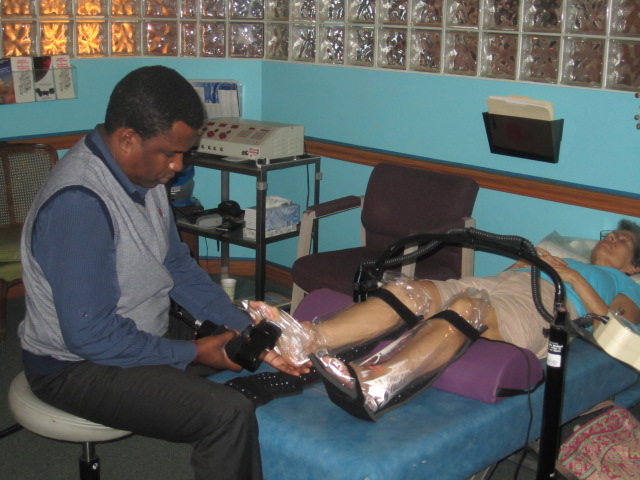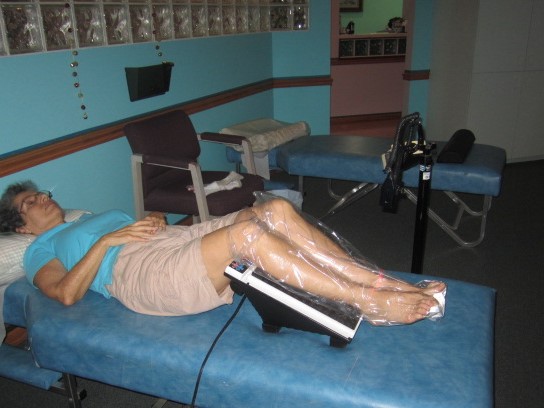Peripheral Neuropathy WARNING!
Lake Park , FL – The most common method your doctor will recommend to treat your neuropathy is with prescription drugs that may temporarily reduce your symptoms. These drugs have names such as Gabapentin, Lyrica, Cymbalta, and Neurontin, and are primarily antidepressant or anti-seizure drugs. These drugs may cause you to feel uncomfortable and have a variety of harmful side effects.
Peripheral neuropathy is a result of damage to the nerves often causing weakness, pain, numbness, tingling, and the most debilitating balance problems. This damage is commonly caused by a lack of blood flow to the nerves in the hands and feet which causes the nerves to begin to degenerate due to lack of nutrient flow.
As you can see in Figure 2, as the blood vessels that surround the nerves become diseased they shrivel up which causes the nerves to not get the nutrients to continue to survive. When these nerves begin to “die” they cause you to have balance problems, pain, numbness, tingling, burning, and many additional symptoms.
The main problem is that your doctor has told you to just live with the problem or try the drugs which you don’t like taking because they make you feel uncomfortable. Our facility location is right here in Lake Park that offer you hope without taking those endless drugs with serious side effects. (see the special neuropathy severity examination at the end of this article)


In order to effectively treat your neuropathy, three factors must be determined.
1) What is the underlying cause?
2) How Much Nerve Damage Has Been Sustained.
NOTE: Once you have sustained 85% nerve loss, there is likely nothing that we can do for you.
3) How much treatment will your condition require?
The treatment that is provided at All American Wellness Center has three main goals:
1) Increase blood flow
2) Stimulate small fiber nerves
3) Decrease brain-based pain
The treatment utilizes 3 highly sophisticated lazers and low level light therapy
The Second treatment method is to stimulate small nerve fibers, utilizing specific frequency vibration techniques to critical areas of the body.
Nerve fibers are stimulated and turned back on, improving your sensation and balance. This is critical as balance problems can lead to falls and potentially, causing life threatening injuries.
The third step utilizes specific nutraceuticals to target tiny blood vessels and improve circulatory function, as well as, specialized transcutaneous nerve therapy to reduce pain and improve proper nerve function.
The low level light therapy is like watering a plant. The light therapy will allow the blood vessels to grow back around the peripheral nerves and provide them with the proper nutrients to heal and repair. It’s like adding water to a plant and seeing the roots grow deeper and deeper.
The amount of treatment needed to allow the nerves to fully recover varies from person to person and can only be determined after a detailed neurological and vascular evaluation. As long as you have not sustained at least 85% nerve damage there is hope!
Dr. Usry, D.C. at All American Wellness Center will do a neuropathy severity examination to determine the extent of the nerve damage for only $70. This neuropathy severity examination will consist of a detailed sensory evaluation, extensive peripheral vascular testing, and a detailed analysis of the findings of your neuropathy.
Call 561-863-8779 to make an appointment with Dr. Usry, D.C. to determine if your peripheral neuropathy can be treated.
All American Wellness Center is located 1 mile east of I-95 1 mile west of US HWY 1 at 1541 Prosperity Farms Road. (Just 4 Buildings South of North Lake Blvd it’s the Big Blue Building)
If you suffer from peripheral neuropathy, All American Wellness Center, with offices in Lake Park, FL, offers peripheral neuropathy physical therapy and treatments to help relieve symptoms. Our treatments can help improve movements, blood flow, and more. Contact us today to learn more about this diagnosis and how we can help you
This life-impacting condition affecting millions of Americans can be helped and even reversed. If you are suffering from painful pins and needles, burning sensations or even weakness in your legs, feet or toes or your arms, hands and fingers, making it difficult to walk or perform simple activities, don’t despair. We can help you. Whether your neuropathy is chemical in nature, such as diabetes, chemical toxicity or chemical deficiency or mechanical such as disc disease or arthritis, we have the answer to your problem and to alleviate your suffering. Call us today and find out if you qualify for this successful non-surgical technique.
What is peripheral neuropathy?
Peripheral neuropathy describes damage to the peripheral nervous system, the vast communications network that transmits information from the brain and spinal cord (the central nervous system) to every other part of the body. Peripheral nerves also send sensory information back to the brain and spinal cord, such as a message that the feet are cold or a finger is burned. Damage to the peripheral nervous system interferes with these vital connections. Like static on a telephone line, peripheral neuropathy distorts and sometimes interrupts messages between the brain and the rest of the body.
Because every peripheral nerve has a highly specialized function in a specific part of the body, a wide array of symptoms can occur when nerves are damaged. Some people may experience temporary numbness, tingling, and pricking sensations (paresthesia), sensitivity to touch, or muscle weakness. Others may suffer more extreme symptoms, including burning pain (especially at night), muscle wasting, paralysis, or organ or gland dysfunction. People may become unable to digest food easily, maintain safe levels of blood pressure, sweat normally, or experience normal sexual function. In the most extreme cases, breathing may become difficult or organ failure may occur.
Some forms of neuropathy involve damage to only one nerve and are called mononeuropathies. More often though, multiple nerves affecting all limbs are affected-called polyneuropathy. Occasionally, two or more isolated nerves in separate areas of the body are affected-called mononeuritis multiplex.
In acute neuropathies, such as Guillain-Barré syndrome, symptoms appear suddenly, progress rapidly, and resolve slowly as damaged nerves heal. In chronic forms, symptoms begin subtly and progress slowly. Some people may have periods of relief followed by relapse. Others may reach a plateau stage where symptoms stay the same for many months or years. Some chronic neuropathies worsen over time, but very few forms prove fatal unless complicated by other diseases. Occasionally the neuropathy is a symptom of another disorder.
In the most common forms of polyneuropathy, the nerve fibers (individual cells that make up the nerve) most distant from the brain and the spinal cord malfunction first. Pain and other symptoms often appear symmetrically, for example, in both feet followed by a gradual progression up both legs. Next, the fingers, hands, and arms may become affected, and symptoms can progress into the central part of the body. Many people with diabetic neuropathy experience this pattern of ascending nerve damage.
How are the peripheral neuropathies classified?
More than 100 types of peripheral neuropathy have been identified, each with its own characteristic set of symptoms, pattern of development, and prognosis. Impaired function and symptoms depend on the type of nerves-motor, sensory, or autonomic-that are damaged. Motor nerves control movements of all muscles under conscious control, such as those used for walking, grasping things, or talking. Sensory nerves transmit information about sensory experiences, such as the feeling of a light touch or the pain resulting from a cut. Autonomic nerves regulate biological activities that people do not control consciously, such as breathing, digesting food, and heart and gland functions. Although some neuropathies may affect all three types of nerves, others primarily affect one or two types. Therefore, doctors may use terms such as predominantly motor neuropathy, predominantly sensory neuropathy, sensory-motor neuropathy, or autonomic neuropathy to describe a patient’s condition.
What are the symptoms of peripheral nerve damage?
Symptoms are related to the type of affected nerve and may be seen over a period of days, weeks, or years. Muscle weakness is the most common symptom of motor nerve damage. Other symptoms may include painful cramps and fasciculations (uncontrolled muscle twitching visible under the skin), muscle loss, bone degeneration, and changes in the skin, hair, and nails. These more general degenerative changes also can result from sensory or autonomic nerve fiber loss.
Sensory nerve damage causes a more complex range of symptoms because sensory nerves have a wider, more highly specialized range of functions. Larger sensory fibers enclosed in myelin (a fatty protein that coats and insulates many nerves) register vibration, light touch, and position sense. Damage to large sensory fibers lessens the ability to feel vibrations and touch, resulting in a general sense of numbness, especially in the hands and feet. People may feel as if they are wearing gloves and stockings even when they are not. Many patients cannot recognize by touch alone the shapes of small objects or distinguish between different shapes. This damage to sensory fibers may contribute to the loss of reflexes (as can motor nerve damage). Loss of position sense often makes people unable to coordinate complex movements like walking or fastening buttons, or to maintain their balance when their eyes are shut. Neuropathic pain is difficult to control and can seriously affect emotional well-being and overall quality of life. Neuropathic pain is often worse at night, seriously disrupting sleep and adding to the emotional burden of sensory nerve damage.
Smaller sensory fibers without myelin sheaths transmit pain and temperature sensations. Damage to these fibers can interfere with the ability to feel pain or changes in temperature. People may fail to sense that they have been injured from a cut or that a wound is becoming infected. Others may not detect pains that warn of impending heart attack or other acute conditions. (Loss of pain sensation is a particularly serious problem for people with diabetes, contributing to the high rate of lower limb amputations among this population.) Pain receptors in the skin can also become oversensitized, so that people may feel severe pain (allodynia) from stimuli that are normally painless (for example, some may experience pain from bed sheets draped lightly over the body).
Symptoms of autonomic nerve damage are diverse and depend upon which organs or glands are affected. Autonomic nerve dysfunction can become life threatening and may require emergency medical care in cases when breathing becomes impaired or when the heart begins beating irregularly. Common symptoms of autonomic nerve damage include an inability to sweat normally, which may lead to heat intolerance; a loss of bladder control, which may cause infection or incontinence; and an inability to control muscles that expand or contract blood vessels to maintain safe blood pressure levels. A loss of control over blood pressure can cause dizziness, lightheadedness, or even fainting when a person moves suddenly from a seated to a standing position (a condition known as postural or orthostatic hypotension).
Gastrointestinal symptoms frequently accompany autonomic neuropathy. Nerves controlling intestinal muscle contractions often malfunction, leading to diarrhea, constipation, or incontinence. Many people also have problems eating or swallowing if certain autonomic nerves are affected.


Instructional Videos On Peripheral Neuropathy
All American Wellness
Chiropractor Lake Park
-
1541 Prosperity Farms Rd
Lake Park, FL 33403 - (561) 863-8779
- [email protected]
-
Monday - Friday:
10AM - 1PM & 2PM - 6PM




